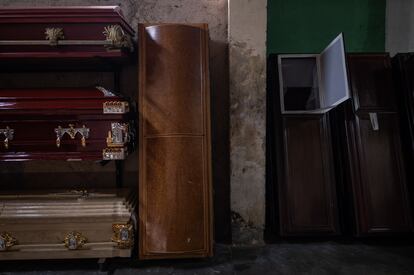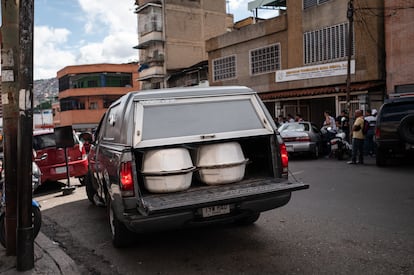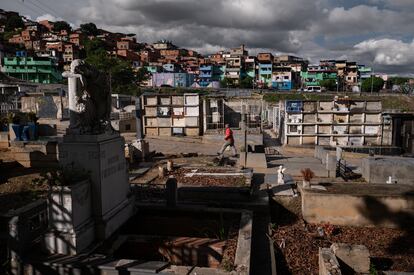Venezuela’s informal economy takes over the mortuary business
Unlicensed operators are capitalizing on the exorbitant cost of a simple funeral service in a country with the lowest minimum wages in the region


The death of a relative can mean financial ruin for a family in Venezuela, the country with the lowest minimum wage in the region, so informal businesses have moved in to offer inexpensive mortuary services. Bereaved relatives are approached by what some call “briefcase funeral homes.” Others have a more colorful name – “vultures.” It’s difficult to afford even a basic funeral service in Venezuela. The $250-$400 cost is roughly 60 times a pensioner’s monthly income. Unregulated operators have sprung up to offer a solution in the difficult process of saying farewell to a loved one. Licensed funeral homes, like everyone else, are feeling the pinch in a country where the economy has shrunk by a third in less than 10 years.
“The cost of funeral services has adapted to the country’s situation; the same protocols are no longer followed,” said Luis Mora, the longtime owner and operator of a funeral home in western Caracas. By “protocols,” Mora means cars for the funeral cortege, floral arrangements, refreshments for the wake, and publishing obituaries in a country that doesn’t have any daily newspapers anymore. One of the most conspicuous examples of this new informality is the practice of using any old vehicle to transport corpses to a crematorium or cemetery. We recently spotted a man in Caracas’ Petare neighborhood cleaning up an old station wagon that he had modified to use as a hearse. Pickup trucks are also often used to transport coffins. He was cleaning the vehicle a few steps away from a small, licensed funeral home that had been idle for almost a month.

Death may seem like a recession-proof business, but people in the industry say informal competition has taken a toll. The enormous outbound migration of Venezuelans – nearly 20% of the population and growing – has also hurt the country’s economy. “We’re not doing funeral services anymore – the clandestine operators have taken over,” said Jorge Villalobos, president of Venezuela’s mortuary industry association. Villalobos describes these clandestine operators as vehicles with their rear seats removed to make space for coffins. They strap chairs to the roof so mourners can quickly set up a wake at the deceased’s home. “This has significantly affected funeral companies all over the country – we’ve experienced a 50% drop in business, at least.” Villalobos says funeral homes must have licenses to transport chemicals, contracts for disposing pathological waste, and personnel trained in dealing with bereaved families.
But in real life, the rules are not always followed. Luis Rivas runs a funeral home in Petare (a massive low-income neighborhood in Caracas) with a chapel for funeral services or posthumous memorial tributes. The chapel has a large cross with a crucified Christ on the back wall that can be easily removed if the room is used for an evangelical Christian service, which is increasingly common in Venezuela. Rivas is an experienced embalmer, which he says doesn’t require much more than “injecting formaldehyde into the stomach to preserve the organs.” But it can be difficult to get your hands on formaldehyde these days. Rivas recently began hosting social events at hospitals in which they distribute arepas or medical supplies to people waiting with patients in the city’s poorly equipped emergency rooms. “We don’t do it to drum up business, but if we get a client, that’s good. Some people can’t even afford a breakfast, so how are they going to pay for a burial?”

Regulations
The takeover of the funeral business by informal operators has prompted several Venezuelan municipalities to regulate the sector. After conducting hearings and a funeral home registration process, the Caracas City Council approved a new ordinance in mid-June to regulate the industry. The city’s largest public cemetery – Southern General Cemetery – said 176 vehicles suitable for transporting the deceased were registered in the capital. The recently introduced regulation includes fees for maintaining cemeteries, with a particular focus on the Southern General Cemetery. Although designated as a national heritage site, the cemetery has been plagued by neglect and vandalism for years. “There is still space available and we’re constructing new vaults in some neglected areas. We can build between 200 and 500 new ones a month to meet demand. The area for cremation urns is also being reorganized to provide about 2,150 spaces for people with limited means,” said Marlin Prado, the cemetery’s general manager. Prado says they’re also seeking to regulate private funeral home services and offer a low-cost service from the municipality. “Given the country’s economic situation, we need to optimize service delivery so users are not impacted financially.”
The expansive 500-acre cemetery established 150 years ago is full of history and thousands of gravestones, mausoleums of famous Venezuelan families and religious imagery. One of the gravediggers suggested maximizing the cemetery’s unused space, pointing to a little strip of land. “You can build a vault for a little child there with 15 cement blocks; for an adult, you need 50,” he said.

A burial in this public cemetery costs around $240, but a plot in a private cemetery can cost up to $1,000, not including the funeral and burial expenses. Cremation costs half as much as a burial, so it’s the only option for most Venezuelans. Some municipalities even offer financial aid to cover funeral expenses.
For the past five years, Aura Piñera has been running a copy service from a kiosk near the Caracas forensic medical unit. “Some can afford them [funerals], others can’t. Funeral homes are now offering services to the highest bidder. I’ve seen people here take up to two weeks trying to collect enough money to bury their loved one,” said Piñera. “During the pandemic, there were long lines of people here. The same happens during police raids when 30 dead bodies show up here in a single day, and up to 90 over a weekend. But they’re not doing those raids as much anymore,” she said. Police raids in low-income neighborhoods often result in extrajudicial executions. Rampant police brutality in Venezuela has been loudly denounced by victims, non-governmental organizations and international watchdogs.

Sign up for our weekly newsletter to get more English-language news coverage from EL PAÍS USA Edition
Tu suscripción se está usando en otro dispositivo
¿Quieres añadir otro usuario a tu suscripción?
Si continúas leyendo en este dispositivo, no se podrá leer en el otro.
FlechaTu suscripción se está usando en otro dispositivo y solo puedes acceder a EL PAÍS desde un dispositivo a la vez.
Si quieres compartir tu cuenta, cambia tu suscripción a la modalidad Premium, así podrás añadir otro usuario. Cada uno accederá con su propia cuenta de email, lo que os permitirá personalizar vuestra experiencia en EL PAÍS.
¿Tienes una suscripción de empresa? Accede aquí para contratar más cuentas.
En el caso de no saber quién está usando tu cuenta, te recomendamos cambiar tu contraseña aquí.
Si decides continuar compartiendo tu cuenta, este mensaje se mostrará en tu dispositivo y en el de la otra persona que está usando tu cuenta de forma indefinida, afectando a tu experiencia de lectura. Puedes consultar aquí los términos y condiciones de la suscripción digital.








































